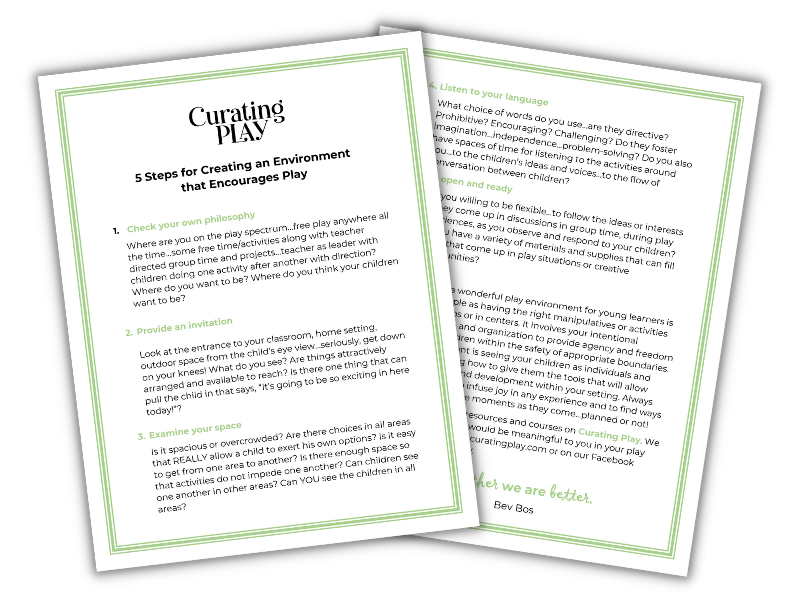“Is she ready for school?” “Does he know his ABCs?” “How high can they count?”
All questions asked by countless caregivers, grandparents, family members, parents as children near age five. And it’s often loaded with anxiety, pride, and confusion. But what does “ready” mean? Depending on who you ask, school readiness could refer to a list of academic benchmarks, a child’s behavior in a group setting, or even whether they can sit still for long periods of time.
As early education specialists, play advocates, and developmental thinkers, we need to push back on outdated definitions and offer something more holistic—and more human.
At Curating Play, we advocate for a powerful reframing:
School readiness isn’t just about getting children ready for school.
It’s about getting schools ready for children.
And it’s about preparing families to be partners in the journey
What School Readiness Too Often Means
In too many systems, school readiness has been reduced to a checklist—letters, numbers, fine motor skills, following directions. These skills aren’t bad in themselves, but when narrowly focused on academic tasks or standardized expectations, they miss the richness of childhood development. They also disproportionately disadvantage children who come from diverse cultural or socioeconomic backgrounds, who are multilingual, or whose developmental path doesn’t follow the “norm.”
This version of readiness puts pressure on children to perform rather than to grow. It rushes play, undervalues relationships, and too often sidelines the uniqueness of the child. And it creates stress for educators and families alike, who feel pushed to “prepare” children through flashcards and drills rather than joyful, meaningful learning and delicious conversations embedded in important adventures. The workbooks in the grocery store aisle may entertain a child for a few minutes but they will never accomplish the skills needed for life-long learning.
A Developmentally Appropriate Vision
Research in early childhood development—from the work of Piaget and Vygotsky to today’s neuroscience—reminds us that young children learn best through active, engaged, meaningful experiences. That means play. It means social interaction. It means rich back and forth conversations with adults who listen and respond. And it means creative and interesting environments that are emotionally safe and responsive to children’s needs.
From this foundation, we propose a broader and more balanced definition of school readiness:
School readiness means:
- Children are socially, emotionally, physically, and cognitively growing through developmentally appropriate experiences.
- Schools are prepared to receive diverse learners with empathy, flexibility, and child-centered practices.
- Families are supported and included as partners in the learning journey.
This definition is not only more inclusive—it’s more accurate and most likely, accomplishes better overall results.
Schools Ready for Children
A school that is “ready” for children is one that values the whole child. It understands that every child brings strengths, interests, and needs. It does not expect all children to be the same, and it adapts accordingly. These schools use play-based learning, offer time for social development, honor linguistic and cultural diversity, and support educators in building warm relationships with children and families.
School readiness, then, is not an end goal—it’s a shared responsibility.
Children Ready for School
Children become “ready” not by mastering content, but by having opportunities to explore, take risks, collaborate, and express themselves. This happens in quality early learning environments, in their homes, in nature, and in communities that understand the value of play. When children are seen, heard, supported and valued, they are far more likely to approach school with confidence, curiosity, and a sense of belonging.
Families Ready to Support
Families are their child’s first and most important teachers. Supporting school readiness must include supporting families—with access to resources, clear communication, and genuine invitations to participate in their child’s learning. When families feel respected and connected, they are more equipped to advocate for what their child needs and more willing to appreciate and reinforce the learning that takes place at school.
Let’s Reclaim the Term
Let’s stop asking whether children are ready to fit into a system—and start asking how we can create systems that fit children. Let’s broaden the idea of readiness to include joy, relationships, culture, and curiosity. Let’s provide skill building opportunities that bring problem-solving, risk, exploration, imagination, and hands-on learning into the heart of early education. Because readiness isn’t just about children adapting to school. It’s about schools and families rising to meet the brilliance of childhood.
.





